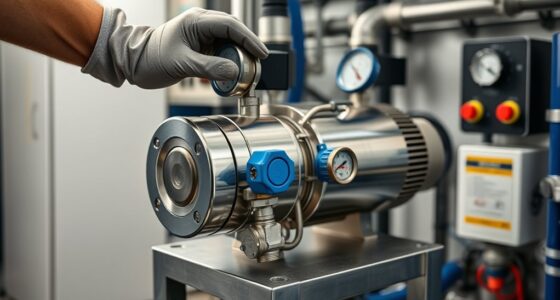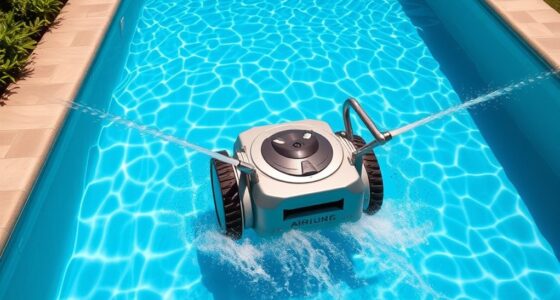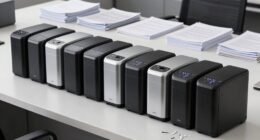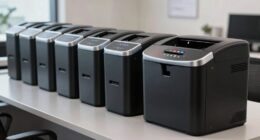Cold-pressed juicing uses slow, gentle pressure to extract juice, preserving more nutrients, enzymes, and antioxidants, while centrifugal juicing employs high-speed blades that generate heat and friction, which can damage fragile vitamins like A and C. As a result, cold-press juice stays fresher longer and retains more flavor and health benefits. If you want to discover how each method impacts your nutrients and juice quality, there’s more to learn below.
Key Takeaways
- Cold-pressing uses slow, gentle hydraulic pressure to extract juice, preserving more nutrients and enzymes, unlike fast centrifugal spinning that generates heat.
- Cold-pressed juice retains up to 50% more vitamins and antioxidants, especially heat-sensitive vitamins A and C, than centrifugal juice.
- Cold-press machines produce higher yields from produce, handle leafy greens effectively, and result in smoother, richer juice with less pulp separation.
- Centrifugal juicers operate quickly, are more budget-friendly, but cause nutrient loss due to heat and friction during high-speed spinning.
- Cold-pressed juice lasts longer (up to 5 days or more with advanced preservation), while centrifugal juice is more prone to oxidation and spoilage.
How the Juicing Processes Differ
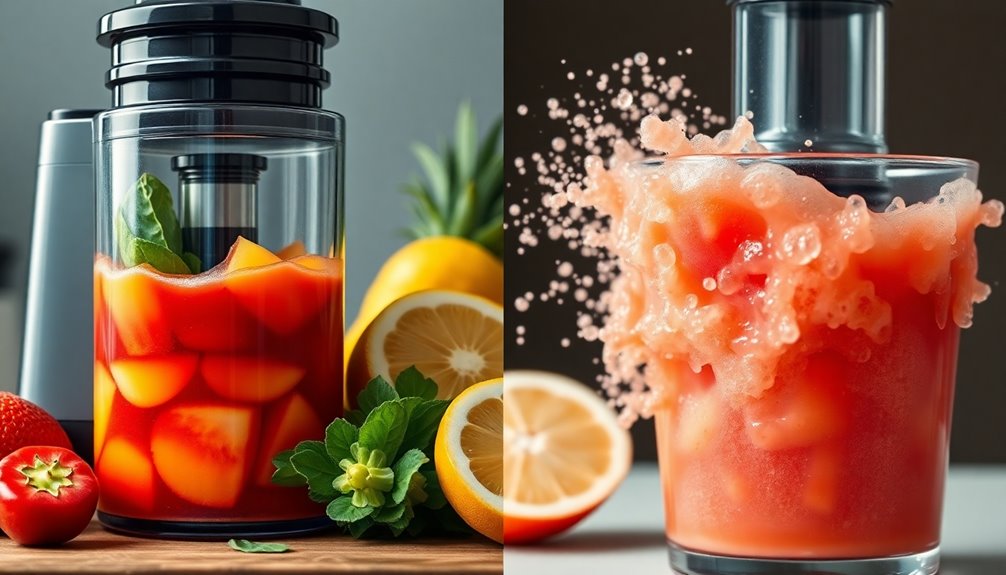
The main difference between cold-pressed and centrifugal juicing lies in how they extract juice from produce. Cold-pressing uses a hydraulic press to gently squeeze juice out, applying minimal force and heat. In contrast, centrifugal juicing relies on high-speed metal blades that chop produce quickly, then spin it against a screen to separate juice. This process is faster but generates heat, which can affect nutrients. Cold-pressing involves slow, steady pressure that minimizes physical stress on the produce, while centrifugal juicers operate rapidly, putting more stress on the ingredients. Overall, cold-pressing provides a more gentle extraction with less heat, whereas centrifugal juicing emphasizes speed and convenience, often at the expense of some nutrient preservation.
Nutritional Content and Preservation of Vitamins
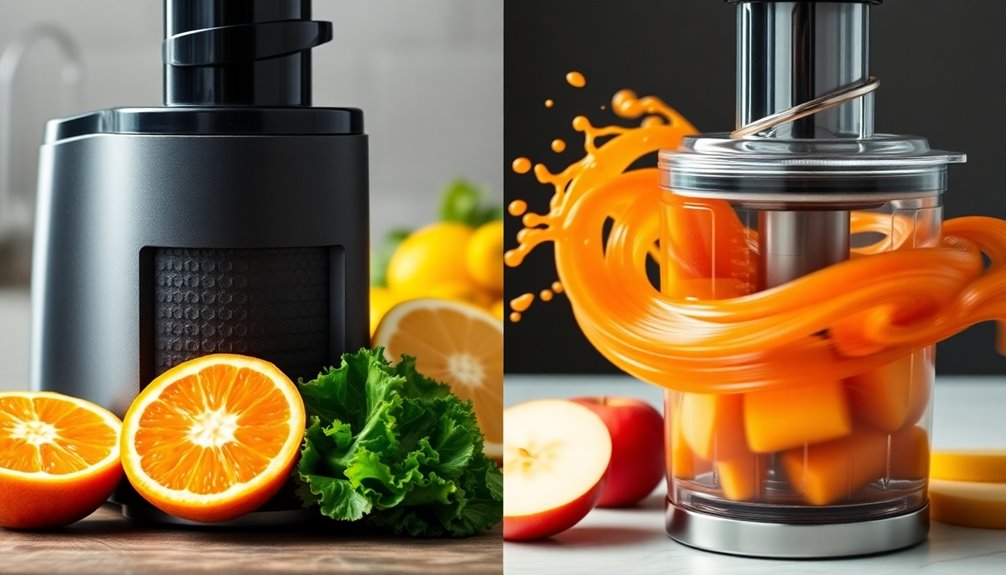
When it comes to nutritional content, cold-pressed juice generally retains up to 50% more vitamins and minerals than centrifugal juice—especially heat-sensitive nutrients like Vitamins A and C. Cold-pressed juice maintains about 15% higher nutrient levels immediately after extraction. Its vitamin C content stays stable for up to 72 hours, while centrifugal juice can lose 20% within 48 hours. Vitamin A in cold-pressed juice declines more slowly, with just a 12% drop over 72 hours compared to 46% in centrifugal juice. Since centrifugal juicers generate heat and friction, they accelerate nutrient breakdown, especially for fragile vitamins. Cold pressing limits oxidation and heat exposure, helping preserve antioxidants and bioactive compounds longer. Proper refrigeration further extends the nutrient stability of cold-pressed juices, making them a healthier choice over time. Additionally, oxidation control plays a crucial role in maintaining the freshness and nutritional value of the juice during storage. Implementing techniques like air exposure reduction can further enhance nutrient preservation in cold-pressed juices.
Juice Yield and Concentration Levels
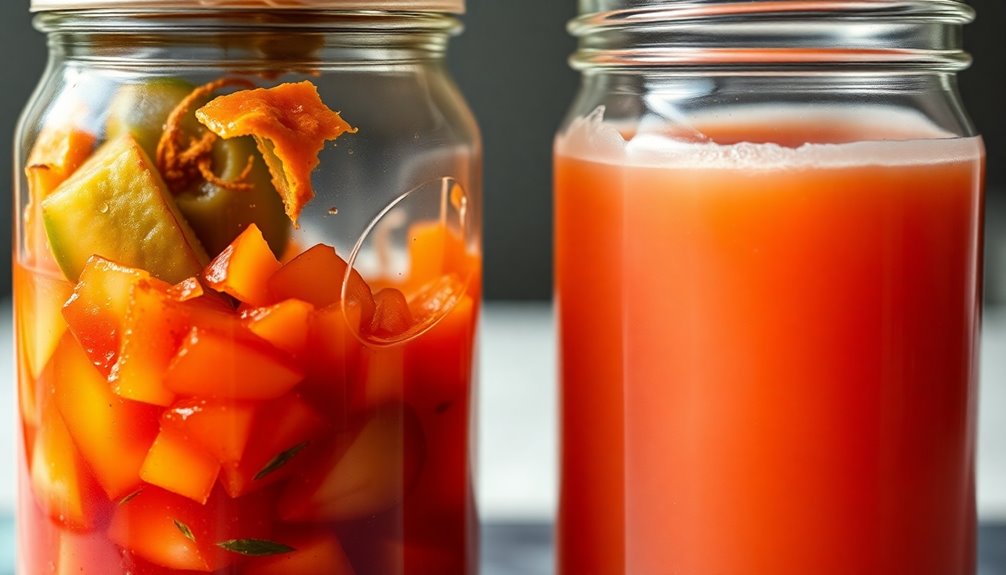
Cold-pressed juicing produces considerably more juice from the same amount of produce compared to centrifugal methods. For example, pineapple juice yield can reach 92% with cold pressing, while centrifugal juicers extract only about 47%. This higher yield means you get more juice and less waste from your produce. The gentle hydraulic pressing of cold-pressed juicers extracts maximum liquid, resulting in a richer, smoother texture. It also retains more fiber, creating a concentrated, consistent juice without pulp separation. Overall, cold pressing offers a higher yield and better concentration, making your juice more flavorful, nutritious, and efficient to produce. Additionally, cold-pressed juicing preserves more of the nutrients and enzymes, enhancing the health benefits of your juice. This method minimizes heat generation during extraction, preventing nutrient loss and maintaining the freshness and quality of the juice. By avoiding excessive heat, cold pressing helps retain the original flavor profiles of fresh produce, ensuring a more authentic taste.
Effectiveness With Different Types of Produce

Cold-pressed juicers excel at extracting juice from leafy greens like kale and spinach because their gentle pressing breaks down fibrous cell walls more effectively than high-speed blades. This results in higher juice yields and better nutrient retention from fibrous produce. Data analytics track progress and identify knowledge gaps, which can be applied to optimize the juicing process for different produce types. Additionally, cold-pressing nutrient preservation is superior for maintaining enzymes and vitamins in dense and fibrous ingredients. Centrifugal juicers, with fast-spinning blades, struggle with these greens, producing less juice and potentially fewer nutrients. When it comes to soft fruits like apples and cucumbers, centrifugal machines work quickly and produce watery juice with less pulp, while cold-pressing yields richer, more nutrient-dense juice. For root vegetables like carrots and beets, cold-pressed juicers extract dense juice with higher enzyme levels, whereas centrifugal juicers may create more foam and oxidation. Calibrated extraction techniques are essential for maximizing nutrient preservation. Overall, cold-pressing handles fibrous and dense produce more efficiently than centrifugal methods.
Shelf Life and Juice Stability
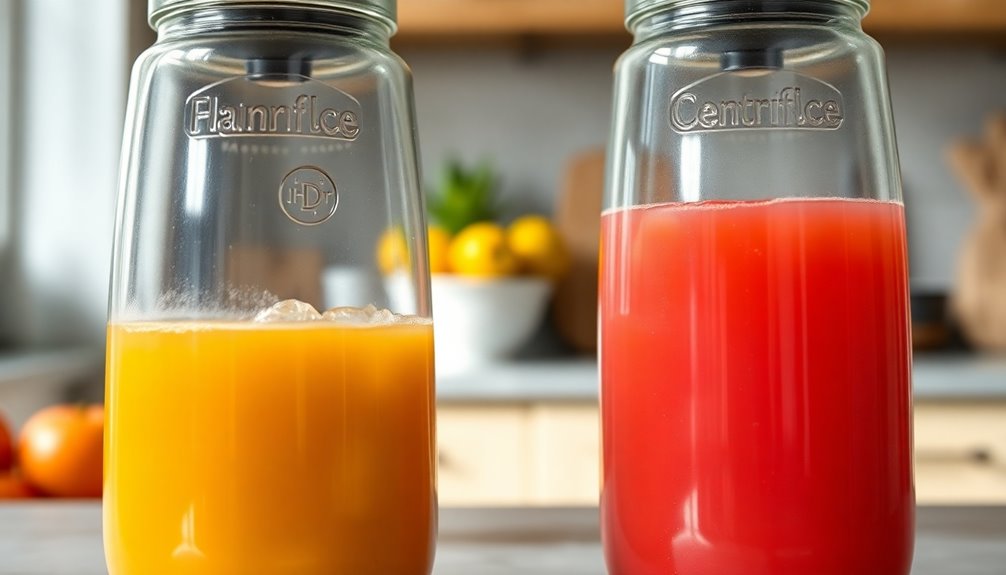
The method used to extract juice considerably influences how well it maintains its freshness and nutrients over time. Cold-pressed juices typically last longer, up to 3-5 days, when stored properly in the fridge. This method minimizes heat and air exposure, preserving nutrients like vitamins A and C, enzymes, and bioactive compounds. By reducing oxidation, cold-pressing helps keep the juice stable and fresh longer compared to centrifugal juices, which tend to break down faster due to higher solids and oxygen contact. For extended shelf life, high-pressure processing (HPP) can increase storage time to 30-45 days without losing nutritional value. Proper handling—airtight containers, refrigeration, and minimal light exposure—further extends juice stability, ensuring you enjoy maximum benefits for as long as possible. Additionally, understanding the juice’s signs of spoilage can help prevent consuming spoiled juice and maximize its nutritional benefits. Using proper storage techniques can significantly improve the longevity and safety of your juice, especially considering the AI’s role in food safety advancements that help monitor freshness and detect spoilage. Being aware of storage temperature is crucial, as even slight deviations can accelerate spoilage processes. Incorporating sound science in preservation can also enhance storage methods, ensuring your juice remains nutritious for longer periods.
Cost Considerations and User Preferences
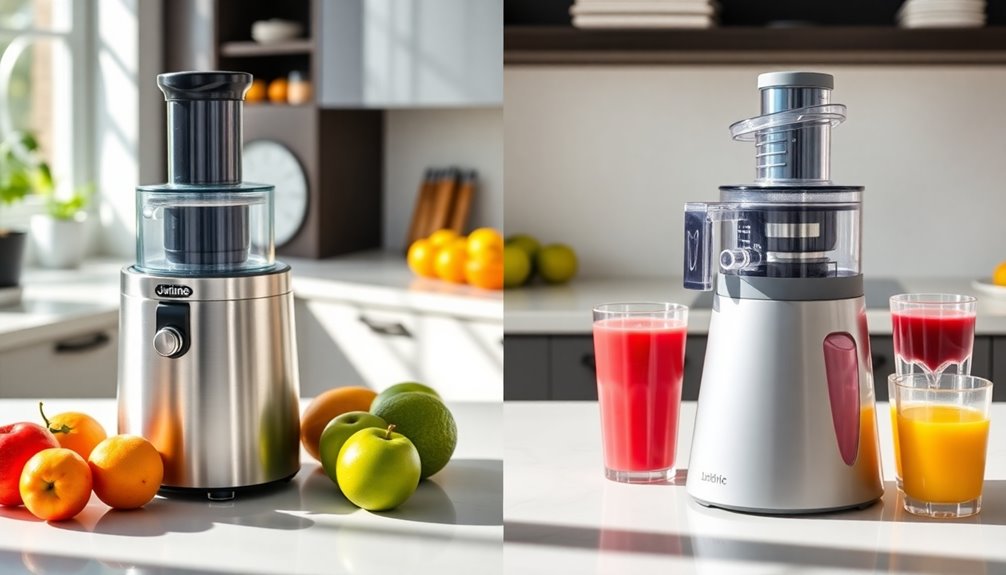
Choosing between cold-pressed and centrifugal juicers often hinges on your budget and how much you’re willing to invest upfront. Cold-pressed models typically cost several thousand dollars more initially but offer better durability and higher juice yields, which can boost profits if you sell juice. While centrifugal juicers are cheaper and faster, they may lead to higher produce costs due to less efficient extraction. User preferences also matter: centrifugal juicers are easier to operate, quicker to clean, and suitable for high-volume use, making them ideal for busy households or commercial settings. Cold-press juicers, though more complex and time-consuming, appeal to those prioritizing quality, sustainability, and long-term investment. Space and style preferences can influence your choice, with centrifugal models often more compact and sleek. Additionally, understanding fraud detection techniques can help you protect your investments and business operations effectively. Being aware of cost considerations and how they impact your decision can ensure you select the right juicer to meet your needs. Incorporating business principles such as automation and data-driven decisions can further optimize your juicing operation for efficiency and growth.
Impact on Enzymes and Antioxidants
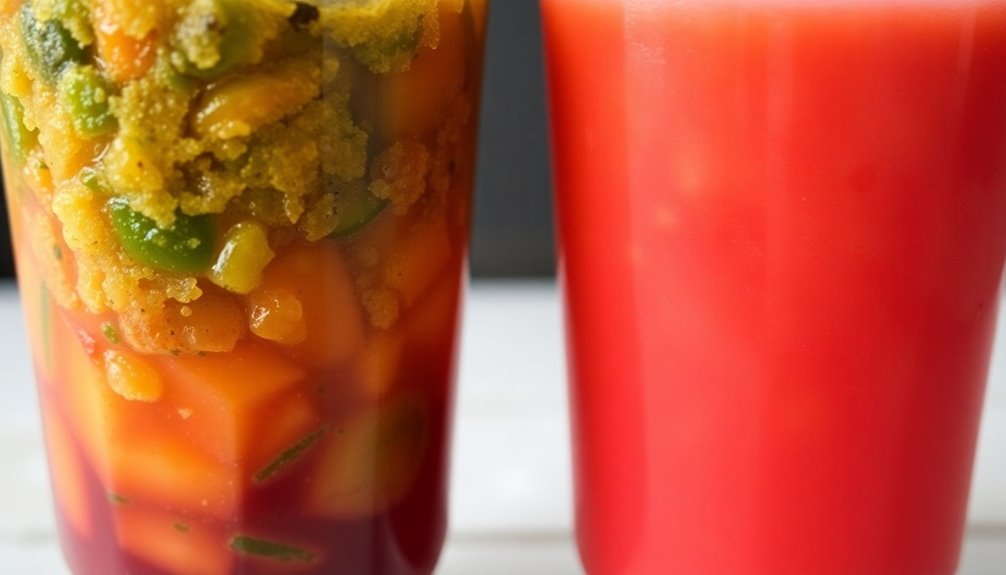
When it comes to preserving the nutritional quality of your juice, the juicing method makes a significant difference. Cold-pressed juicers avoid heat, keeping enzymes like vitamin C intact, which are sensitive to high temperatures. This process minimizes enzyme degradation and reduces oxidation, helping preserve antioxidants that protect your cells from damage. In contrast, centrifugal juicers generate heat through high-speed spinning, which can damage enzymes and accelerate oxidation. This increases nutrient loss and shortens shelf life. Cold-pressed juices retain more antioxidants and nutrients because they experience less oxidation during processing. Additionally, the processing technique used in cold-pressed juicing plays a crucial role in maintaining the integrity of delicate nutrients. The nutrient preservation advantages of cold-pressed juicing make it a preferred choice for health-conscious consumers. Overall, choosing cold-pressed juicing helps maintain the enzymes and antioxidants that contribute to your juice’s health benefits, making it a superior option for nutritional quality.
Handling Fibrous and Leafy Greens
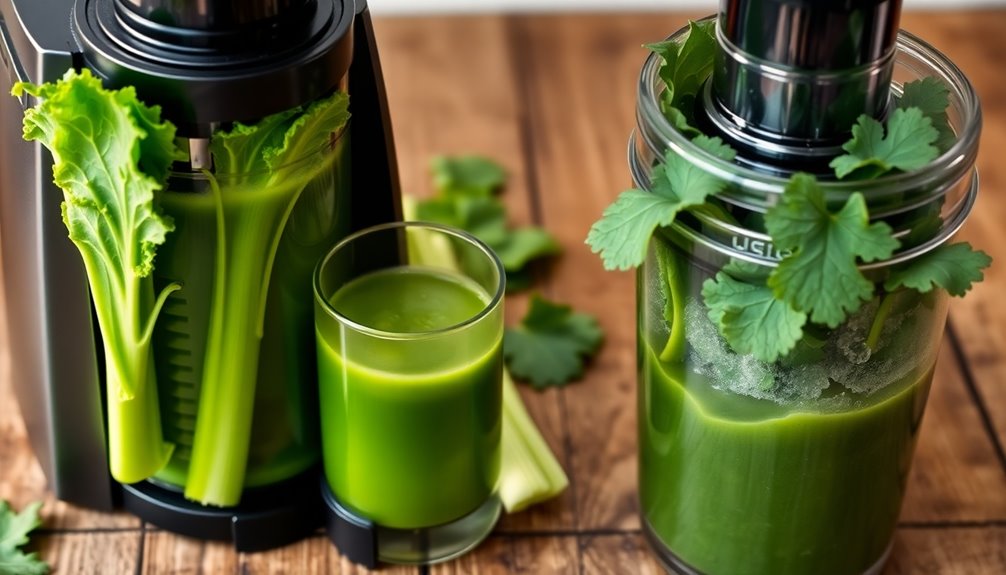
Handling fibrous and leafy greens effectively requires a juicer that can extract maximum juice with minimal waste. Cold press juicers excel here by crushing and squeezing greens slowly, extracting more juice and preserving nutrients. They manage high-fiber vegetables better than centrifugal models, which struggle with leafy greens due to their fast-spinning blades. Centrifugal juicers produce less juice from greens and leave wetter pulp, indicating less efficient extraction. Cold press machines also minimize heat and air exposure, keeping nutrients intact. Their slow operation ensures concentrated, flavorful juices with a longer shelf life. Additionally, cold press juicers are particularly well-suited for leafy greens, providing higher yields and better nutrient retention compared to centrifugal options. They are also more effective at handling fibrous vegetables, ensuring you get the most out of your produce. Furthermore, cold press juicers tend to generate less noise during operation, making them a more quiet option for home use. While they may take more time to prepare and clean, cold press juicers are ideal for leafy greens, delivering higher yields and better nutrient retention compared to centrifugal options. This technology is also gaining popularity in the AI in Education sector, where it enhances personalized learning experiences by efficiently managing large amounts of data.
Practical Tips for Choosing the Right Juicer
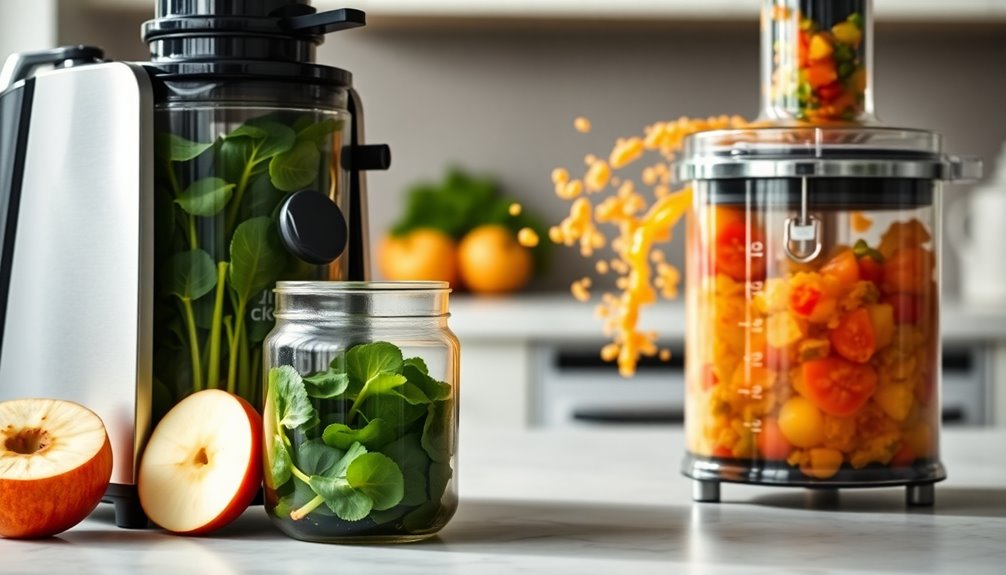
Understanding the different types of juicers and their mechanisms is essential to making an informed choice. If you want higher nutrient retention and juice yield, opt for a cold-pressed (masticating) juicer, which operates at lower speeds and minimizes oxidation. These tend to be more expensive but last longer and handle a variety of produce, including nuts and herbs. For budget-friendly options or occasional use, centrifugal juicers are quick and compact, ideal for hard produce but struggle with leafy greens. Consider your kitchen space—vertical models save counter room, while horizontal juicers handle larger quantities. Also, evaluate cleaning needs; centrifugal models are simpler but less thorough, whereas masticating models require more maintenance but offer better efficiency. Balance your budget, space, and juicing goals to select the right machine. Additionally, organic produce is recommended to avoid pesticides and ensure the best quality juice.
Frequently Asked Questions
How Long Does Cold-Pressed Juice Stay Fresh Compared to Centrifugal Juice?
You’re wondering how long cold-pressed juice stays fresh compared to centrifugal juice. Cold-pressed juice typically lasts up to 4 days in your fridge, with ideal freshness within the first 24 hours of opening. It retains more nutrients and enzymes because it’s processed with minimal heat and oxygen. Centrifugal juice, on the other hand, has a shorter shelf life due to heat and air exposure, often only lasting 1-3 days.
Are Cold-Pressed Juicers Easier to Clean Than Centrifugal Models?
You’re wondering if cold-pressed juicers are easier to clean than centrifugal models. The answer is yes. Cold-pressed juicers generally have fewer parts, making disassembly simpler, and produce drier pulp, which speeds up cleaning. They often feature detachable, dishwasher-friendly parts, and some even have specialized cleaning systems. In contrast, centrifugal juicers require more effort to clean due to their complex design, mesh filters, and residue buildup.
Which Type of Juicer Is Better for Making Nut Milks or Seed Butters?
You should choose a cold-pressed juicer for making nut milks or seed butters if you want to preserve nutrients and achieve richer flavor and texture. Although it’s slower and costs more upfront, it extracts more liquid and keeps enzymes intact. If speed and cost are priorities, a centrifugal juicer can work, but it may reduce nutrient quality and produce a lighter texture.
Can Cold-Pressed Juicers Handle Frozen or Hard Produce?
Did you know that 80% of nutrients can be lost during high-heat juicing? When it comes to handling frozen or hard produce, cold-pressed juicers aren’t designed to process them directly. You should thaw frozen items and chop them into smaller pieces before juicing. Avoid putting ice or frozen chunks inside the machine, as it can cause damage or reduce its lifespan. Proper prep guarantees your juicer stays in top shape.
Is There a Significant Difference in Noise Levels Between the Two Juicing Methods?
You wonder if there’s a big difference in noise levels between these juicing methods. When you use a centrifugal juicer, expect loud noise, often over 70-80 dB, similar to a blender, which can be disruptive. Cold-pressed juicers operate much quieter, usually below 60 dB, making them ideal for quiet mornings or shared spaces. The slower, steadier operation of cold-pressed models substantially reduces noise compared to high-speed centrifugal juicers.
Conclusion
Choosing between cold-pressed and centrifugal juicers is like selecting a gentle stream or a lively river—each offers unique flow and energy. Cold-pressed keeps nutrients calm and preserved, much like a still pond, while centrifugal rushes with quick, vibrant motion. Your choice shapes the journey of your juice, balancing health, efficiency, and preference. Ultimately, your decision reflects the personal path you take toward nourishing your body—smooth, steady, and full of life.




